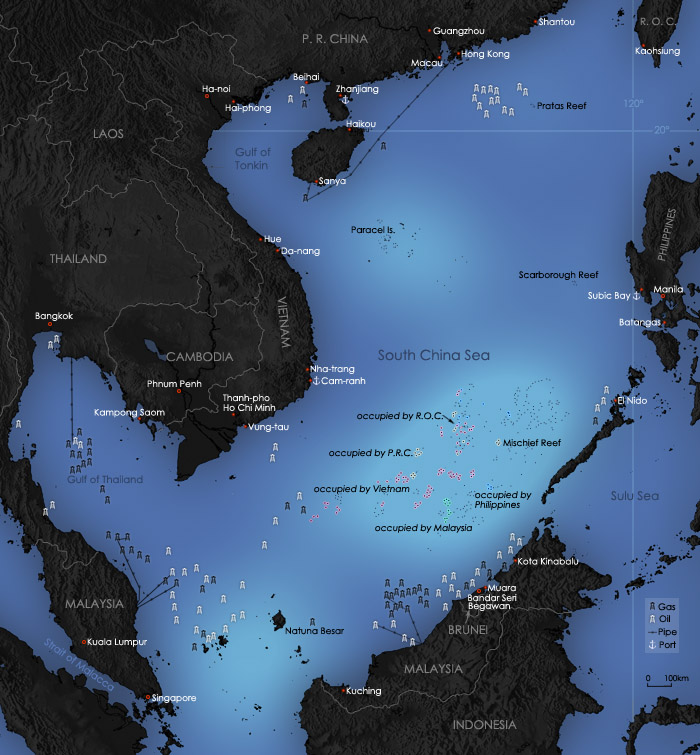“If Only Two NATO Members Could Bury the Hatchet”
In light of the euro zone debt crisis that has spread from Greece, many European countries, among them NATO members, are looking at their military spending as a possible source for budget cuts. As NATO’s Secretary General, Anders Fogh Rasmussen, warns that excessive cuts in defence budgets risk undermining the Alliance’s strategic concept for global security in the years ahead, it is Greece who is being scrutinized for its bloated defence spending, the highest in Europe in proportion to GDP. While at the core of the problem is Greece’s relationship with Turkey, the debt crisis is giving Greece the extra impetus needed to improve relations with its traditional rival.
In an interview with the Financial Times, Mr. Rasmussen, speaking as a former Prime Minister of Denmark, said he understood the pressure to cut defence spending in a number of European countries such as the UK, while underlining the need for defence spending for global security.
“…I know how, when you have to cut welfare programmes, it is very hard to exclude your defence programme from such cuts…. If you make cuts that are too deep in defence spending, you affect long-term security. And we know that insecurity and instability will not merely hamper economic development, travel and trade but they will increase the cost of internal security even more.”
Rasmussen’s words were echoed in NATO’s recently unveiled, draft “Strategic Concept”, a 10-year vision for the Alliance designed to help define the challenges it will meet in the 21st century. The committee of expert authors, led by former U.S. Secretary of State Madeleine Albright, underlined the need for NATO members to maintain defence spending if the Alliance is to continue its effort in Afghanistan and deal with threats from terrorism and cyber warfare. Pointedly, only six of NATO’s 26 European members are currently meeting their defence spending target of two percent of GDP. Heavily indebted Greece and its rival Turkey are two of these countries.
The Greek defence budget was the subject of discussion at the NATO Parliamentary Assembly in Riga on May 31st, as parliamentarians from across the Alliance debated the impacts of the country’s recent financial crisis. At a meeting of the Assembly’s Economics and Security Committee, British Member of Parliament, Peter Bottomley, enquired after the level of Greek military spending, and whether it was expected to be reduced following the 110-billion-euro bailout from the European Union and the International Monetary Fund.
In exchange for the bailout, Greece is expected to raise its retirement age, reform its pension system, and reduce its public sector spending. Although an IMF Press Release states that “there will be a significant reduction in military expenditures during the program period,” there are no detailed plans. Speaking at the Parliamentary Assembly, Spyros Economides, senior lecturer on international relations at the London School of Economics, commented that “nowhere have I seen the level of those cuts, or where they are going to come from.”
Historically, Greece has been supported militarily by an outside ‘sponsor’, using Greece’s strategic location in order to hamper its regional rivals. Indeed, the modern Greek state owes its independence to the support of the United Kingdom, which sought to use Greece as a means to balance the unravelling Ottoman Empire with the rise of Imperial Russia in the early 19th century. More recently, during the Cold War, the United States and NATO backed Greece as a part of the Western bid to keep the Soviet Union and Yugoslavia contained.
With the end of the Cold War, such support has ended and the reduction of military spending became an issue in Greek politics. The former Prime Minister Kostas Karamanlis (2004-2009) had proposed a reduction to military spending through a “Defence Eurozone”, referring to the European Security and Defence Policy. The previous PASOK (Panhellenic Socialist Movement), administration also planned on reducing military spending prior to its failure to be re-elected in 2004. The parties on the left side of the spectrum were also vocal in condemning military spending, criticizing the administration regarding the purchase of 30 F-16 and 333 Leopard tanks in 2005. Greece’s two economic mainstays — shipping and tourism — have not sufficed to plug the spending gap caused not only by defence but also social spending. Greece managed the difference with borrowed money, contributing to the debt nightmare and current financial crisis. There is hope however that Greece will cut its defence budget – as of 2009, PASOK has once again become the majority party with their leader Papandreou as Prime Minister.
Greek military spending has consistently been among the highest, as a proportion of GDP, in the Alliance for decades, largely in response to tensions with their neighbour, fellow NATO member, and longstanding rival, Turkey. Despite the country’s tip into recession, the Greek defence budget actually rose nominally by 6.9 percent in 2009 from € 5.81 billion to € 6.24 billion. A country with a population of 11 million, Greece was the world’s fifth-biggest weapons importer between 2005 and 2009, according to the Stockholm International Peace Research Institute (SPIRI).
Now Greece faces the challenge of taming its 13.6 percent budget deficit to the allowed 3 percent ceiling mandated by the EU’s Stability & Growth Pact by 2014. That date was set by the EU and IMF as part of its bailout agreement. Already the 2010 defence budget has been reduced, albeit slightly. With the Greek economy is expected to contract by up to 4 percent this year and again in 2011, the reality is that meeting that investment level is a near impossibility, according to Forecast International’s European Defence Analyst Dan Darling. Nonetheless, the figure represents the highest annual allocation in real terms among all of Europe’s NATO member states. By comparison, the two highest nominal defence spenders in Europe – the U.K. and France – allocate 2.3 and 2 percent, respectively, toward their militaries on an annual basis. Like Greece, these countries face serious budget deficit and national debt crises on the horizon and will be forced by fiscal reality to curtail future defence budget growth.
In light of the not all together new economic challenges facing Greece, one has to wonder why Greek military spending has been exempt from public scrutiny for so long.
“The conflict with Turkey has been overwhelmingly the thing that’s been keeping Greek military spending as a share of GDP and the arms purchases high” since the Cold War ended, says Sam Perlo-Freeman, head of SPIRI’s military expenditure project. “In the rest of Europe it’s been for the most part completely flat or declining over the last 10 years.”
Lingering issues remain between the two NATO members, involving territorial disagreements and questions about the diplomatic status of Turkish-controlled northern Cyprus. Turkey keeps about 30,000 troops on Cyprus since a 1974 invasion to reverse a coup by supporters of union with Greece. Both militaries still base their war-gaming scenarios on an attack by the other, according to military analysts and diplomats. Greece and Turkey were nearly drawn into conflict as recently as 1996 over an uninhabited Aegean islet, four miles off the Turkish coast. In response, Greece’s prime minister at the time, Costas Simitis, launched a 10-year, $17 billion arms-procurement program, even while acknowledging that “that the burden is too heavy for the Greek people.” Fighter planes from the two neighbours are still regularly engaged in mock dog-fights in disputed Aegean airspace. A Greek pilot was killed in 2006 after colliding with a Turkish plane.
Territorial mistrust remains a constant flashpoint. Greek officials say the causes of tensions need to be resolved before disarmament, meanwhile maintaining a military doctrine of “equal retaliation” with Turkey, which requires something close parity in military capabilities. Yet Turkey has twice as big an economy as Greece, more than three times as many troops, and a population close to seven times as large. Furthermore, Turkey has emerged over the last decade as a growing regional power. According to the International Strategic Studies group Turkey spent $10.2 billion on defence in 2008 and $9.9 billion in 2009, but its economy is forecast to grow faster than any in the EU this year, so Ankara has less need to make cuts. Turkey’s population is 72 million and its 600,000-strong army is the second-biggest in the North Atlantic Treaty Organization after the U.S. Turkey’s Finance Ministry says defence spending will be about $10 billion this year, or 1.5 percent of GDP.
However, Turkish relations with Greece have been normalizing ever since Recep Tayyip Erdoğan of the Justice and Development Party (AK Party) became Prime Minister in 2003. “A principle of zero problems towards neighbours has been successfully implemented for the past seven years”, explains Turkey’s Foreign Minister in a May 2010 interview with Foreign Policy Magazine. Turkey’s relations with its neighbors now follow a more cooperative track. Since the second half of 2009, Turkey established high-level strategic council meetings Greece, amongst others.
This policy has resulted in talks of an ‘entente’ in military spending. In his first official visit to Greece since 2004, Erdogan said issues under discussion with Greek Prime Minister George Papandreou included cuts to arms spending. On Friday, May 14th, 2010 the Turkish Prime Minister visited Athens with 10 ministers and some 80 businessmen to discuss a plethora of issues, in what both sides hailed as a new era in ties between two NATO members. The countries signed 21 bilateral agreements on issues ranging from tourism, energy and environment, to curbing illegal migrants coming through Turkey, a major problem for Greece.
In the lead-up to the visit, both leaders had called for mutual cuts in defence spending. Yet no plan emerged, and the two leaders made no mention of defence budgets in the follow-up news conference. No declarations were made either, on the longstanding issues of Cypriot sovereignty or the name of the Former Yugoslav Republic of Macedonia, two significant bones of contention.
Cutting military spending may not be unwelcome for Erdogan, since it would likely help curb the political influence of Turkey’s army. Throughout his term, Erdogan has clashed with generals who view his Islamist-rooted party as a threat to Turkey’s secular system. The army has in fact ousted four governments since 1960 and now dozens of military officers are facing trial on charges of plotting to oust Erdogan. Moreover, the ruling AK Party officials believe in liberalization and EU integration, which is weakening the role and power of the military – a traditional bulwark on the way of Islamists to power.
Yet neither the Turks nor the Greeks can “afford to appear as if they are capitulating” said Theodore Couloumbis, an emeritus professor at the University of Athens. A further reason is that Mr. Erdogan doesn’t have control over Turkey’s military or its budget, which is unaudited and notoriously opaque, making any cuts difficult to verify, according to Bill Parker, a specialist on Turkey’s military at Kings College in London. Unlike Greece, Turkey is enjoying relative economic health, posing another hurdle to securing parallel defence cuts. With the economy forecast to grow by more than 5% this year, there is little pressure for big cuts. Additionally, some of Turkey’s most expensive defence procurement programs are also politically popular because they provide jobs. Observers have also noted that Turkey is expanding its geopolitical prowess, which means that Ankara has outgrown its security concern with Greece, which may explain why it is trying to use conciliatory gestures to reassure Athens that it no longer sees Greece as a challenger.
It is possible that Greece will continue to view Turkey as its principle strategic threat, unless Turkey reciprocates with evidence of a reduction in its military capabilities, namely reducing its air and sea presence from disputed territory, removing forces from northern Cyprus, and finally shrinking the defence budget. A realist approach would dictate that Athens maintain its state of military preparedness. If Greece does reduce its military budget, the key would be where the cuts are made. Modernization investments are “essential” for the Greek military, “especially in the land forces, however cutting away the dead wood of the military apparatus” would be “not only possible, but welcome,” according to Economides of the London School of Economics.
One of the major backers of the EU bailout for Greece is Germany, who is also a major supplier to the Greek military. Beneficiaries of Greece’s weapons spending include Duesseldorf-based steelmaker and shipbuilder ThyssenKrupp AG, which is supplying submarines for the Greek navy under a contract worth more than € 2.5 billion euros. Greece fell behind on payments to the company last year. “This is a conundrum,” Economides said. “We call them offset agreements, but they are offside agreements. They really undermine the whole process, if you give with one hand and take with the other in this kind of crisis.”
The problem for Greece will come primarily in its defence equipment budget. Under its two medium-term defence armament programs (referred to as the EMPAE) approved in July 2006, the Greek defence establishment planned to invest a total € 26.8 billion toward equipment procurement and maintenance. However, the bulk of the first-term (2006-2010) program money (€ 1.4 billion,) was used to pay off debt for equipment procured under a previous EMPAE. The second program, covering the period from 2011-2015, planned on a €15.4 billion budget. Instead, what remains for the second-term budget will likely be used much like its predecessor – to pay off debts accrued under the preceding EMPAE.
IMF chief Dominique Strauss-Kahn insisted on May 2nd that traditional levels of Greek defence investment will be “clearly reduced” under the austerity measures implemented by the government as part of the agreed-upon bailout. But with lingering modernization programs (namely for multipurpose frigates, advanced trainers, and new-generation fighters) and with an unchanged attitude towards Turkey, the Greek defence budget can only be slashed so much. Expecting it to fall by much more than 10 percent over the coming three years might prove untenable.
The key to the future of Greek defence spending lies in the building of mutual trust with Turkey. Keeping their absolute spending on par with Turkey is an unsustainable proposition. Considering Turkey’s strengthening position, it is unclear whether Greek demands to parallel cuts will go answered. In fact, no such agreement was reached in the bilateral meetings this past May though feelings of good will abounded and were demonstrated by the signing of 21 other bilateral agreements. While cuts to the military would fit with Turkish Prime Minister Erdogan’s zero-conflict policy, he must be careful not to agitate the powerful Turkish military. Working within the fiscal constraints of the EU-IMF bailout package, Greece needs to invest in the modernization of its military, which would be in line with NATO’s proposed new Strategic Concept, while reducing its spending to comparable proportions in Europe (i.e. 2-3% of GDP).
By: Monika Wyrzykowska
*Disclaimer: Any views or opinions expressed in this article are solely those of the authors and do not necessarily represent those of the NATO Council of Canada. This article is published for information purposes only.
NATO warns states over defence cuts, NATO emphasizes defence spending despite crisis, Greek Military Spending Under the Spotlight After Economic Crisis, Greek, Turkish PMs meet, discuss defence cuts, Forecast International assesses effects of budget cuts on Greek defence, Old Enemy May Help Greece Trip Its Budget Deficit, Greece: Defence Spending and the Financial Crisis, Greece and Turkey Steer Around Defence Cuts, Turkey’s Zero-Problems Foreign Policy, Turkey’s Foreign Policy Plans in 2009



